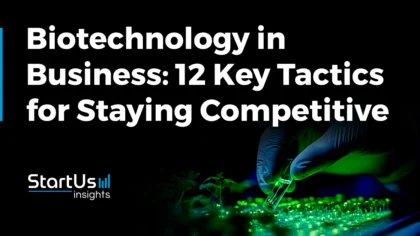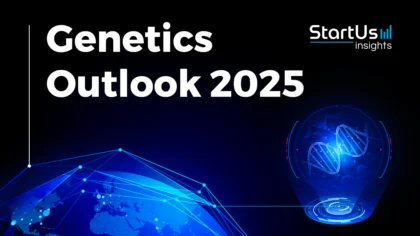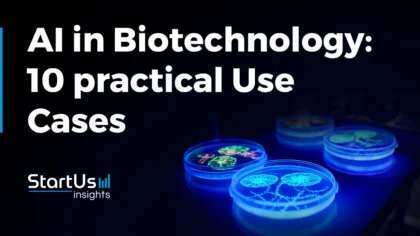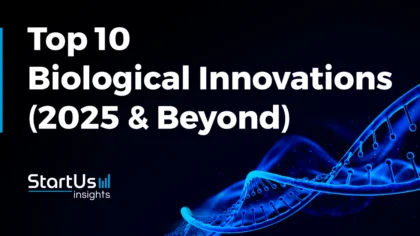Recent advancements in biotechnology address global challenges like climate change, demographic shifts, and energy transitions. It also enhances sustainability, food security, and care delivery. For example, applications of biotechnology in business harness microorganisms to degrade contaminants and reduce environmental pollution. It also addresses healthcare issues by enabling personalized medicine, improving biopharmaceutical production, and offering antibiotic therapeutics.
Further, biofuels and biodegradable materials allow enterprises to address climate change through gene-modified crops that show better resilience to drought, salinity, and extreme temperatures. For example, Resurrect Bio employs gene-editing technology to boost crop immunity against pathogens and VIA Biofuels leverages synthetic biology to produce biofuels that decarbonize the methods of fuel production.
Why should you read this report?
- Gain insights into the top biotechnology innovations impacting businesses
- Discover 30+ biotechnology application areas
- Learn about 10+ innovative startups offering breakthrough solutions

Key Takeaways
- Tackling Climate Change
- Use Cases:
- Carbon Capture
- Climate-Resilient Crops
- Synthetic Biology
- Startup to Watch: Resurrect Bio
- Use Cases:
- Demographic Shifts
- Use Cases:
- Personalized Medicine
- Biomarker Discovery
- Vaccine Development
- Startup to Watch: Foveo Fertility
- Use Cases:
- Rapid Urbanization
- Use Cases:
- Urban Agriculture
- Biosensing
- Health Monitoring
- Startup to Watch: Indoor Harvest Farms
- Use Cases:
- The Energy Transition
- Use Cases:
- Biofuel Production
- Microbial Fuel Cells
- Enzyme Engineering
- Startup to Watch: VIA Biofuels
- Use Cases:
- Future of Mobility
- Use Cases:
- Biodegradable Materials
- Synthetic Biology
- Bio-Batteries
- Startup to Watch: VIA Biofuels
- Use Cases:
- The Hyper-Connected World
- Use Cases:
- DNA for Data Storage
- Biosecurity
- Biological Computing
- Startup to Watch: Biomemory
- Use Cases:
- Rise of Technology & Industry 5.0
- Use Cases:
- Personalized Cancer Treatments
- Biomanufacturing
- Precision Fermentation
- Startup to Watch: Ananta Technologies
- Use Cases:
- Shifting economic Trends
- Use Cases:
- Precision Medicine
- Remote Biotech Solutions
- Bioeconomy Development
- Startup to Watch: Greenstone Biosciences
- Use Cases:
- Innovating to Zero
- Use Cases:
- Resource Depletion Prevention
- Zero Carbon Emissions
- Low Energy Biosystems
- Startup to Watch: SeaSoil
- Use Cases:
- Health and Wellness Evolution
- Use Cases:
- Regenerative Medicine
- Microbiome Therapeutics
- Biomarker Discovery
- Startup to Watch: Biomimir
- Use Cases:
- Uncertain Geopolitical Nature
- Use Cases:
- Local Manufacturing
- Food Security
- Portable Labs
- Startup to Watch: Planet Biotech
- Use Cases:
- Fracturing World
- Use Cases:
- Localized Vaccine Production
- Cellular Agriculture
- Decentralized Biomanufacturing
- Startup to Watch: AIS Biotech
- Use Cases:
FAQs: How Biotechnology Empowers Businesses
How is biotechnology used in business?
Biotechnology primarily impacts pharmaceuticals, agriculture, and environmental management businesses. In pharmaceuticals, companies utilize biotechnological techniques to develop new drugs, vaccines, and diagnostic tools. This includes the use of recombinant DNA technology to produce therapeutic proteins and monoclonal antibodies to enhance treatment options. In agriculture, biotechnology improves crop yields and resistance to pests through genetic modification. This enables farmers to meet food demands while minimizing environmental impact.
What is the future of biotechnology?
The future of biotechnology is characterized by advances in personalized medicine, synthetic biology, and gene editing. Personalized medicine utilizes genetic information to tailor treatments for individual patients and enhance therapeutic efficacy. Synthetic biology expands the boundaries of traditional biotechnology by enabling the design and construction of new biological parts, devices, and systems. This innovation fosters the creation of biofuels, biodegradable plastics, and novel therapeutic agents. Moreover, gene editing technologies, like CRISPR, modify genetic material with precision and pave the way for breakthroughs in genetic diseases and agricultural improvements.
Where We Get Our Data From
StartUs Insights gathers data through its exhaustive Discovery Platform, covering information on 4.7 million startups, scaleups, and tech companies globally, alongside 20,000 emerging technologies and trends. The Discovery Platform accelerates startup and technology scouting, trend intelligence, and patent searches, offering thorough insights into technological advancements. By leveraging the trend intelligence feature for this report, we identified emerging technologies within specific industries. This process allows us to uncover patterns and trends, and pinpoint relevant use cases and the startups creating solutions for each scenario. Additional capabilities and information can be found at StartUs Insights Discovery Platform.
12 Ways Biotechnology Advances Business [2025 & Beyond]
1. Tackling Climate Change
It focuses on leveraging biotech solutions to reduce greenhouse gas emissions. By introducing gene-modified crops, companies boost the immune system of crops to various climate conditions, produce good yields, and enhance soil health. Introducing bioplastics that degrade quickly compared to traditional plastics addresses the need for a climate-positive environment. Further, Biotechnology promotes climate-resilient agriculture practices that create salt-tolerant, heat-resistant, and drought-resistant crop varieties.
3 Practical Use Cases of Biotechnology in Tackling Climate Change
- Carbon Capture: Biotechnology employs microorganisms like cyanobacteria and enzymes to capture and convert CO2 from industrial processes into useful products. They have less impact on the environment and contribute to the positive climate change.
- Climate-resilient Crops: Gene editing enables crops that withstand variable weather conditions, pests, and diseases. These crops contribute to the positive climate change in the environment, confirming food security compliance.
- Synthetic Biology: This technology helps in extracting valuable resources from wastewater and landfills. Also, it boosts the production of bio-fertilizers by engineering bacteria for nitrogen fixation which contributes to the reduction in greenhouse gas emissions,
Startup to Watch: Resurrect Bio
UK-based startup Resurrect Bio develops gene-editing technology that enhances the immune systems of crop species. It uses resistance genes (R-genes) which crops have lost over time due to selective breeding. The company’s technology allows the users to understand the immune receptor network and pathogen effector biology in plants to modify the immune system of crop species. Resurrect Bio’s technology targets specific pathogens without introducing foreign DNA or harming beneficial microbes, thereby increasing genetic diversity and providing robust disease resistance. The company’s current work aims to enhance soybean defenses against diseases like soybean cyst nematode, addressing significant yield losses in sustainable farming.
2. Demographic Shifts
Biotechnology addresses the impacts of demographic shifts by advancing gene therapy, and cell therapy solutions improving disease management, and enhancing healthcare access for aging populations. Regenerative Medicine replaces damaged tissues and organs and increases the quality of life of patients while reducing the need for organ transplantation. Biotechnology helps in the development of new vaccines and diagnostics to prevent infectious diseases.
3 Practical Use Cases of Biotechnology in Demographic Shifts
- Personalized Medicine: Aging populations require specific treatments based on their lifestyle and genetic factors. It allows healthcare providers to analyze disease risk based on past data, and determine the most suitable treatment for the individual.
- Biomarker Discovery: Biomarkers enable early detection of diseases for aging populations facilitating timely treatments and individual care for them. Biomarker discovery is applicable for a wide array of spectrum of diseases and healthcare research.
- Vaccine Development: New vaccines solve the challenges posed by the changing disease patterns, age-specific diseases, and lifestyle changes in modern cities. Vaccine developers ensure they are easy to store, maintain, and track to fulfill the needs of the mass population.
Startup to Watch: Foveo Fertility
UK-based startup Foveo Fertility improves the oocyte retrieval and selection process in IVF treatments. Its device ensures that egg cells are maintained at a consistent temperature eliminating the risk of temperature fluctuations that impact oocyte quality. The technology features a pump and chamber system that prevents the egg cells from coming into contact with air, thereby maintaining optimal conditions. The chamber holds the collected eggs, the pump maintains a constant medium flow while the device ensures follicle fluid is not in contact with air during oocyte collection and preserves the viability of the eggs, enhancing the workflow efficiency in IVF labs.
3. Rapid Urbanization
In the cities that show a continuous increase in population over a year, advancements in biotechnology tend to serve the needs of the people. Biotechnology enables the development of crops suitable for vertical farming, allowing for effective food production in urban environments. Enzymes like Cytochrome P450 convert plant waste into sustainable products like nylon, and fuels. Gene expression platforms allow faster and more efficient vaccine production which is crucial for addressing the health challenges in urban environments.
3 Practical Use Cases of Biotechnology in Rapid Urbanization
- Urban Agriculture: Growing crops on rooftops, vertical farms, and indoor spaces enables the reduction in the usage of pests, and chemicals during crop production. It encourages localized food production and produces the same output during varying climate conditions.
- Bioconstruction Materials: The development of green construction materials such as mycelium-based bricks and bio-concrete are leaving less carbon footprint on the environment and promoting the usage of sustainable construction materials.
- Biosensing: To monitor real-time environmental conditions, biosensors provide information about air quality, soil health, and water quality. This information facilitates the urban planning system to enhance the living standards of the urban population.
Startup to Watch: Indoor Harvest Farms
Indian startup Indoor Harvest Farms utilizes hydroponic farming to grow plants in controlled environments, providing them with the precise nutrients they need for optimal health and nutrition. The company’s farms are equipped with modular vertical farming systems that optimize space and resource use, allowing plants to grow without pesticides. By growing crops in a controlled environment, the company ensures its plants are healthier, more nutritious, and grown with less water compared to traditional farming.
4. The Energy Transition
Energy transition goals lower carbon emissions, increase the efficiency of renewable energy production and create bio-based fossil fuel substitutes. By utilizing microbial fermentation of sugars from crops like corn and sugarcane, bioethanol is produced. Similarly, algae can grow in various conditions, including waste, making it a sustainable source of biofuels. Genetic modification of crops has higher concentrations of particular chemicals and supports biofuel production.
3 Practical Use Cases of Biotechnology in the Energy Transition
- Biofuels Production: Biofuels, such as ethanol and biodiesel are derived using renewable sources by utilizing biotechnology. They lower greenhouse gas emissions from energy production and transportation.
- Microbial Fuel Cells (MFC): MFCs provide a sustainable alternative for decentralized energy production by breaking down organic material in wastewater and treating garbage at the same time.
- Enzyme Engineering: Biotechnology helps in developing enzymes that convert complex biomass into fermentable sugars. This process reduces costs, increases efficiency, and improves overall yield in biofuel production processes.
Startup to Watch: Electric Algae
Israeli startup Electric Algae develops a Bioelectric energy system that uses macroalgae to produce renewable electricity. By making use of macroalgae’s ability to photosynthesize while simultaneously absorbing carbon dioxide from seawater, it converts algae biomass into power. The company’s technology utilizes algae strains cultivated in custom-designed bioreactors, where the microorganisms perform photosynthesis and produce electrons as a byproduct. The company contributes to carbon capture and sustainable resource use while offering inexpensive, soil-less energy. Electric algae provide a clean energy substitute by extracting CO2 from seawater and enhancing the seaweed agriculture industry.
5. Future of Mobility
Biocomposites and biodegradable plastics lighten vehicles and increase efficiency in electric and hydrogen-powered systems. Biofuels derived from algae and renewable resources lower emissions. Microbial activities facilitate better energy storage systems activities, while self-healing materials increase vehicle durability. Biotechnology enables the development of lubricants, and biofuels from algae, bacteria, and plant waste.
3 Practical Use Cases of Biotechnology in the Future of Mobility
- Biofuel Production: Biotechnology utilizes garbage, algae, and other renewable biological sources to produce biofuels. It reduces the transportation sector’s dependency on fossil fuels and cuts greenhouse gas emissions from ships, automobiles, and airplanes.
- Lightweight Biomaterials: Biotechnology creates durable, lightweight biocomposites and biodegradable plastics that increase the range and efficiency of electric and hydrogen-powered cars.
- Bio-batteries: They facilitate microbial processes for the production of modern batteries. This improves energy storage and efficiency for electric vehicles, which is essential for greater driving ranges and quicker charging periods.
Startup to Watch: VIA Biofuels
US-based startup VIA Biofuels employs synthetic biology technology to create green chemicals and sustainable biofuels. The company produces 3-Methylanisole (3-MA), a synthetic aromatic chemical that is essential for decarbonizing mobility in the future, using exclusive yeast strains. VIA Biofuels provides solutions for hydrogen transportation, sustainable aviation fuel (SAF), and biochemicals by utilizing carbon-neutral methods. The company’s proprietary technology 3-MA volatilization converts valuable feedstocks such as starch, sugar, and cellulosic sugars into valuable aromatics through the continuous fermentation process and eliminates energy-intensive downstream distillation steps.
6. The Hyper-Connected World
Biotechnology boosts the integration of digital technologies that allow continuous, real-time data interchange and connection among medical devices. Smart medical gadgets monitor patients remotely and communicate real-time health data to healthcare practitioners is made possible by IoT-enabled equipment. This guarantees earlier intervention, more precise diagnosis, and improved management of chronic illnesses.
3 Practical Use Cases of Biotechnology in the Hyper-Connected World
- DNA for Data Storage: It uses DNA molecules as a medium for storing digital information. DNA storage offers immense data density and durability, capable of preserving information for thousands of years under proper conditions.
- Biosecurity: Biosecurity aims to prevent the misuse of biotechnology, accidental release, and measures designed to protect biological systems, such as humans, animals, plants, and ecosystems, from harmful biological agents, including pathogens and toxins.
- Biological Computing: It utilizes biological molecules, such as DNA, RNA, and proteins, to perform computational tasks. Biological computing leverages the natural properties of biological systems to process information, store data, and execute complex operations.
Startup to Watch: Biomemory
French startup Biomemory converts biomass into data using its DNA drive, to store data with a high density up to one exabyte per gram. The DNA DRIVE encodes digital information into synthetic DNA strands, providing a sustainable solution with less environmental impact. This technology operates at ambient temperatures with less energy input and emits no CO2 during storage. It provides better durability, with the potential to preserve data for thousands of years. This bio-based storage solution assembles data using bio-sourced components, resulting in a storage medium that is stable at ambient temperature without requiring energy input.
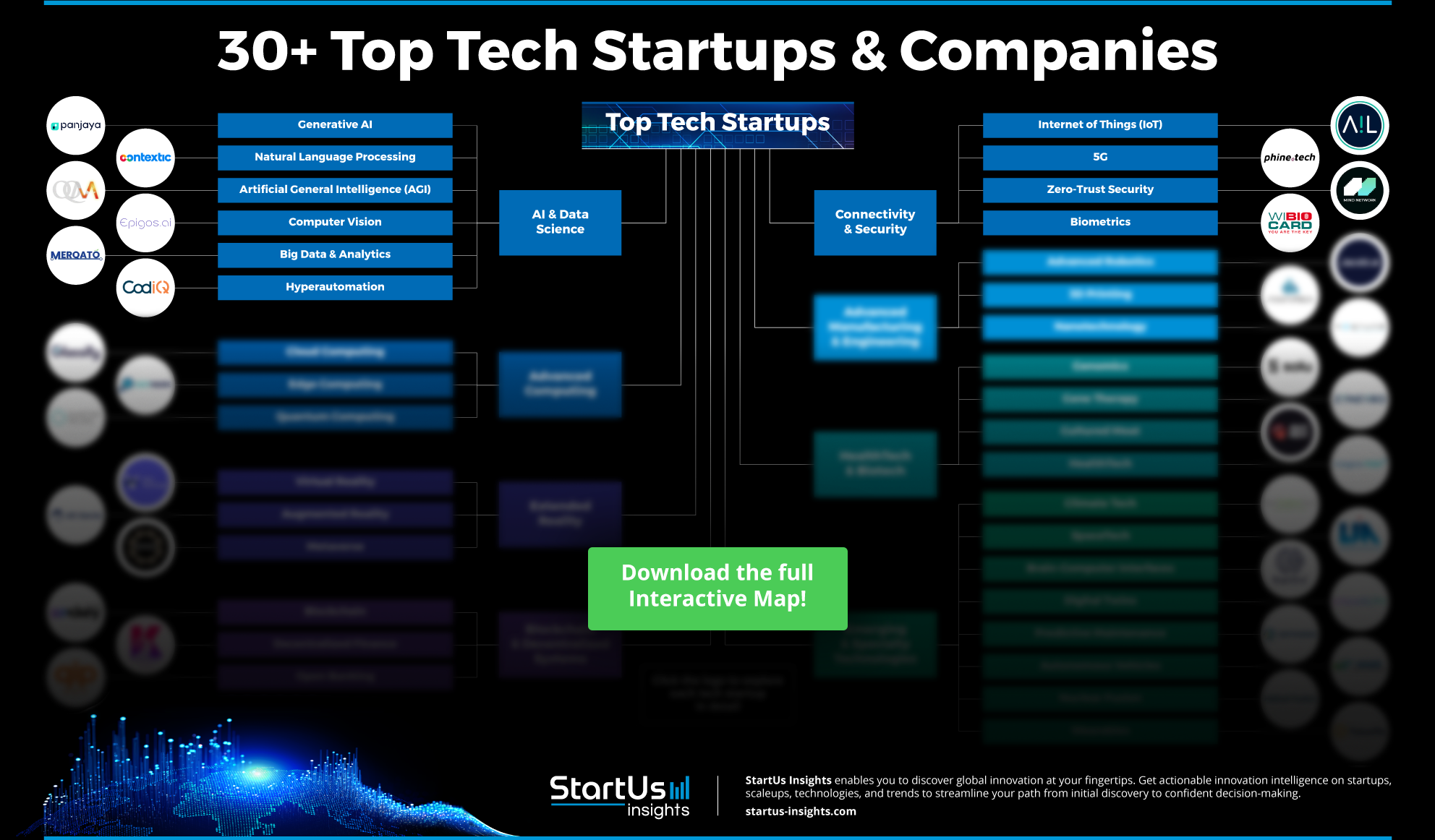
7. Rise of Technology and Industry 5.0
Biotechnology enables data analytics, artificial intelligence, and genetics to create personalized medicine. It provides more effective, individual treatments and therapies for each patient based on their genetic composition and medical records. Integration of biological systems with human-centric technologies like biomanufacturing, and genetic engineering solutions also contributes to health and safety advancements by facilitating real-time health monitoring through biosensors.
3 Practical Use Cases of Biotechnology in Rise of Technology and Industry 5.0
- Personalized Treatments: AI combines patient’s genetic data to find mutations and adjusts therapy accordingly. It produces focused medications that are more efficient and cause fewer side effects.
- Biomanufacturing: Improvements in the construction and control systems of bioreactors advance drug manufacturing facilities. This reduces the setup cost and improves the scalability and efficiency of cell culture procedures.
- Precision Fermentation: This process serves as an alternative protein source and turns substrates into products like enzymes and biofuels. By maintaining optimum pH, temperature, and oxygen concentrations, the desired product is obtained.
Startup to Watch: Ananta Technologies
US-based startup Ananta Technologies enables Chimeric Antigen Receptor (CAR) T-cell therapy for improved cell therapy manufacturing through modified bioreactor solutions. They have developed centrifugal fluidized expansion (CentriFLEX) perfusion bioreactor that uses cell cultures without membrane filters by balancing centrifugal forces with a steady flow of fresh fluid. The modified design addresses cell product loss while simultaneously feeding fresh media and removing inhibitory cellular waste. This technique reduces manufacturing lead times and streamlines procedures while preserving increased cell densities and growth rates.
8. Shifting Economic Trends
There is a notable change of increase in investments in bioprocessing methods, where fermentation methods and rapid disease screening are predominant. Integration of these techniques with AI and machine learning results in a faster drug development process, patient diagnostics, and personalized medicine for aging populations. Because of the shift towards sustainable manufacturing solutions, advancements in synthetic biology and biomanufacturing promote scalable solutions for pharmaceuticals and industrial chemicals.
3 Practical Use Cases of Biotechnology in Shifting Economic Trends
- Bioeconomy Development: It promotes the sustainable use of biological resources and practices. This approach also enhances waste management by converting waste into valuable products such as biofuels and bioplastics, thereby minimizing pollution.
- Sustainable Textiles: Biotechnology helps in developing renewable fibers like spider silk and biomaterials, reducing reliance on petrochemical-derived fibers. Enzymatic treatments derived from microorganisms improve textile processing by reducing water and energy consumption during the dyeing and finishing stages.
- Food Safety: By creating genetically modified crops that are resistant to climate change and pests biotechnology enhances food safety. It also enables the production of bio-preservatives and natural additives that extend shelf life while maintaining food quality.
Startup to Watch: Greenstone Biosciences
US-based startup Greenstone Biosciences fosters drug discovery through the combination of Artificial intelligence (AI) and human-induced pluripotent stem cells (hiPSCs). This technique models human diseases and improves the efficiency of early medication and safety predictions. The company’s AI platform ADMET.AI identifies possible medication methods and simulates various related processes such as absorption, metabolism, distribution, and excretion.
9. Innovating to Zero
It involves eliminating waste associated with bio-manufacturing methods to zero. This goal streamlines the medication process and targets less energy consumption. It aims to reduce hazardous chemicals, employ bio enzymes as catalysts, and leave fewer by-products while manufacturing medicines in a batch process. Additionally, engineered microorganisms mitigate atmospheric CO2 levels through carbon capture further supporting the zero-emission objectives.
3 Practical Use Cases of Biotechnology in Innovating to Zero
- Resource Depletion Prevention: It focuses on less water consumption, pesticides, and fertilizers for crop production. Drought-resistant, nitrogen-fixing crops are enabling sustainable agriculture practices which results in lowering soil erosion and helps in achieving zero ecological footprint.
- Zero Carbon Emissions: Genetically modified micro-organisms produce biofuels and microbes capture CO2 which helps in achieving net-zero carbon footprints.
- Low Energy Biosystems: By enabling anaerobic digestion methods, waste management turns organic waste into biogas. This conversion makes the greenhouse self-sufficient and utilizes zero energy from external sources.
Startup to Watch: SeaSoil
Polish startup SeaSoil develops biomaterials that are sustainable alternatives to traditional plastics. Utilizing agricultural waste and food waste as resources, the company turns organic waste into valuable biodegradable products like compostable packaging and plant pots. The company’s biomaterials are made through bioprocessing techniques that solve the solution of diverse industries. Additionally, the company partners with forces that create sustainable solutions and lead to the development of eco-friendly biomaterials.
10. Health and Wellness Evolution
It leverages recent health records, genetic data, and biologics to get tailored treatments for individuals. Additionally, CRISPR Therapeutics and Regenerative Medicine focus on treating genetic abnormalities and tissue repairs respectively. StemCell research offers customized solutions for wellness treatments and it supports the development of bioengineered tissues and regenerative therapies that promote faster healing and better management of chronic diseases.
3 Practical Use Cases of Biotechnology in Health and Wellness Evolution
- Regenerative Medicine: It enables tissue engineering, and stem cell therapy that offers personalized therapeutics to patients and addresses diseases which are previously incurable.
- Microbiome Therapeutics: It alters the human microbiome using probiotics to treat diseases including cardiovascular, neurological, and gastrointestinal issues.
- Biomarker Discovery: It enables early disease detection, progression tracking, and the response of particular therapy. Identification of biomarkers contributes to early intervention of disease.
Startup to Watch: BioMimir
Canadian startup BioMimir develops biomimetic polymers that accelerate the body’s natural healing mechanisms. It produces biomaterials with three functions: self-adhesion, anti-inflammatory, and anti-fibrotic conditions. The company’s wound filler treats fistulas and ulcers which change from a liquid to a solid to aid in tissue healing. This method confirms the pricing of the materials while also reducing inflammation and encouraging regeneration.
11. Uncertain Geopolitical Nature
Biotech solutions address geopolitical conflicts as they are flexible and their solutions meet particular region needs. Technologies using synthetic biology reduce the dependence on neighboring countries for raw materials and foster local access to resources. Additionally in healthcare, biotechnological advancements in vaccine production and bio-production methods improve the manufacturing of drugs for pandemics, which exacerbates geopolitical tensions.
3 Practical Use Cases of Biotechnology in Uncertain Geopolitical Nature
- Local Manufacturing: It reduces dependence on other countries and promotes self-sufficient manufacturing using biotech solutions. It enables specific microbes to support the manufacturing of materials, chemicals, and medicines. It reduces reliance on external supply chains and increases focus on local manufacturing of medicines and vaccines.
- Food Security: Technologies such as precision breeding and CRISPR technology enhance crop yield and nutritional value which supports nations facing trade barriers or resource constraints. Alternate protein sources and drought-resistant crops address food security challenges under extreme climate conditions.
- Portable Labs: Portable labs allow laboratory settings on remote or less resource settings location. It enables rapid diagnostics, removing expensive lab infrastructure.
Startup to Watch: Planet Biotech
Spanish startup Planet Biotech’s patented technology protects the crops from heat waves and droughts which increases the harvesting resilience of the field. In unpredictable geopolitical environments, Planet Biotech assists farmers in safeguarding crops against severe weather conditions by incorporating crop models and guaranteeing food security. The company offers solutions that address the changing global context and support long-term environmental sustainability.
12. Navigating the Fracturing World
Biotechnology contributes to food security through the development of genetically modified crops that withstand extreme weather conditions, thus ensuring stable food supplies despite supply chain disruptions. Additionally, biotechnology facilitates the production of biofuels and biodegradable materials, reducing reliance on fossil fuels and mitigating environmental degradation. In healthcare, biotechnological advancements in gene editing and synthetic biology enable the rapid response to emerging diseases.
3 Practical Use Cases of Biotechnology in Navigating the Fracturing World
- Localized Vaccine Production: Companies leverage biotechnology solutions like mRNA-based therapeutics and other vaccination platforms which allows manufacturing of vaccines locally. It reduces dependence on international suppliers and ensures quick response to health crises.
- Cellular Agriculture: It reduces reliance on global supply chains, and produces animal proteins, dairy, and other agricultural products in controlled environments. Accordingly, it minimizes the need for large-scale livestock farming often disrupted by trade restrictions.
- Decentralized Biomanufacturing: Continuous bioprocessing allows medicines such as insulin, antibodies, and cell therapies to be produced closer to the point of care addressing trade barriers and logistical disruptions.
Startup to Watch: AIS Biotech
French startup AIS Biotech develops a nature-inspired solution to trap pathogens that treat emerging infectious diseases. It utilizes materials that mimic natural mechanisms found in the environment, capturing and neutralizing infectious agents. The company’s solution uses sugar-based anti-infective receptors that prevent the attachment of pathogens to epithelial cell surface sugars. Additionally, the bio-engineered platform developed by them mimics the cell receptors, and glycomimetics and prevents the attack of viruses and bacteria by recognizing specific oligosaccharide ligands.
More Data-driven Insights on Biotechnology
Patents & Grants
Biotechnology displays a robust innovation environment, evidenced by the issuance of over 257,000 patents and more than 38,000 grants. This volume underscores the industry’s commitment to research and development, fueling advancements in various biotechnological applications. The concentration of intellectual property indicates active competition among firms to secure breakthroughs in biotechnology.
For more actionable insights, download our free Biotech Innovation Report.
Investment Landscape
The investment landscape in biotechnology remains dynamic, top investors include Mass Challenge, SOSV, Y Combinator, Arch Venture Partners, and Bioinnovation Institute. Key funding types, including seed, early-stage VC/series A, accelerator/incubator, pre-seed, and angel, reflect diverse investment strategies, with the average funding amount per round reaching USD 19.3 million.
Global Footprint
The biotechnology industry maintains a significant global footprint, with established hubs in the US, India, the UK, Germany, and Canada. Key city hubs, including London, New York City, San Francisco, San Diego, and Boston, drive innovation and collaboration. These regions foster a conducive environment for biotechnology firms, facilitating partnerships and enhancing access to talent and resources.
Don’t Miss Out on the Latest Biotech Innovations
Ready to leverage the latest Biotech technologies shaping the future? With StartUs Insights, you gain quick and easy access to over 4.7 million startups, scaleups, and tech companies, along with 20,000 emerging technologies and trends. Our AI-powered search and real-time database provide exclusive solutions that set you apart from the competition.
Industry giants like Samsung, Nestlé, and Magna trust our innovation intelligence tools to lead trends, optimize operations, and uncover new market opportunities. Benefit from our unmatched data, comprehensive industry views, and reliable insights to drive strategic decision-making. Get in touch to learn how our tailored discovery options can accelerate your innovation journey.
Discover All Biotech Companies & Startups!
